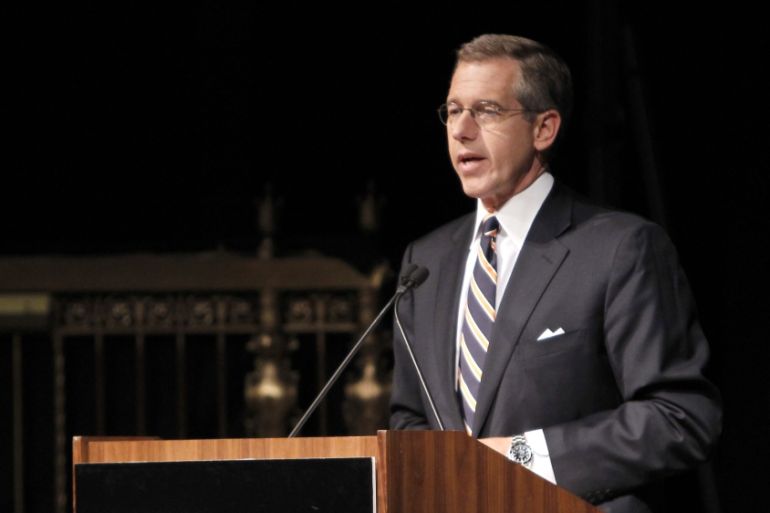Brian Williams and the Middle East fantasy
The Middle East is still the geopolitical Wild West, where American heroes earn their stripes.

Brian Williams did more than simply lie. He romanticised, riding high above the scorched earth and endless desert of war-torn Iraq. While a passenger on a Chinook helicopter flying towards Najaf in 2003, Williams – NBC’s lead news anchor and journalistic talisman – imagined that his “helicopter was hit by an RPG”.
Williams lied. However, the context in which the lie was formed has been largely under-examined during the media fallout and firestorm. Williams’ fabricated tale of heroism took place in Iraq, a nation at the heart of a region long associated with “savagery and violence, backwardness and dogma”.
The Middle East is still the geopolitical Wild West, where American heroes earn their stripes, and if they are fortunate to return home alive, may very well become stars. Williams, a student of history and journalism, was aware of the esteem earned by journalists who endured violence in the Middle East; and therefore cognisant of what his own personal Middle Eastern conquest would mean for his profile and career.
Lying as branding
In an era where news personalities are more brands than journalists, Williams fabricated a story to enhance his cachet and marketability. What more effective way to solidify a news personality’s brand than braving the Middle East, and living to tell about its ubiquitous danger?
|
|
Williams brandished his fabricated near-death experience as a badge of courage, a tale of American valour that enhanced his masculine and patriotic bona fides to NBC viewers.
Williams did not simply look the part, but his acts of heroism bolstered what America has come to expect from its male news anchors. Figures – who aside from simply delivering the news – are positioned by television networks like NBC as archetypes of American masculinity; men who represent America, and who American men should aspire to become.
The story served Williams well for nearly 12 years, and helped augment his profile as one of the US’ most respected news personalities until it was finally revealed in early February that Williams was lying about his near-death experience in Iraq all along.
The pilot flying Williams’ helicopter on that day in 2003 confirmed that another helicopter in the convoy was hit, further marring his journalistic integrity and amplifying calls that NBC terminate the night-time news fixture.
Disorienting the fantasy
For days, NBC fidgeted while Williams remained tight-lipped. The embattled Williams finally apologised on February 4, stating that he “made a mistake in recalling the events of 12 years ago”.
Recollection vacillates between fact and fantasy, generally veering closer to the axis that garners the greatest benefit. Williams veered towards the latter to augment his profile. And by doing so – he lied. A lie that, when told in and about the Middle East, was not deviant, but age-old custom.
The Middle East is a region where fantasy usually trumps facts. Far more than merely a geographic designation, the region is a normative and civilisational barometer of what the West is, and indeed, what it is not.
The Middle East is a region where fantasy usually trumps facts. Far more than merely a geographic designation, the region is a normative and civilisational barometer of what the West is, and indeed, what it is not.
The Middle East is the antithesis of America, and the neatly crafted construction of it as place, and people, is more a product of imagination than objectivity. Therefore, the Middle East is where fantasy flourishes, and fiction is etched into history and present-day news stories as fact.
Because the Middle East is oriented as civilisational antithesis, acts of heroism performed within its confines are of the highest order. From Lawrence of Arabia to the American Sniper, those that tame the region’s unruly, or gun down “savages” in the name of God and country, are forever immortalised.
Tradition and truth clash
The Middle East, after domestic territories have been conquered, is the new Manifest Destiny, where the men who advance it are heroes. Today and forever.
In his landmark work, Orientalism, Edward Said highlighted how the illustration of the Middle East (and its people) within modern journalism is no different than colonial depictions: “In newsreels or news-photos, the Arab is always shown in large numbers. No individuality, no personal characteristics or experiences. Most of the pictures represent mass rage and misery, or irrational [hence hopelessly eccentric] gestures.”
Williams’ lie was formed in a region where the people have no names or distinguishable faces. A space where fantasy and fiction were not only expected, but the very guiding principles that dictated the construction of the region’s history, and the modern coverage of its news stories.
Williams did, in fact, lie. But his lie was not an aberration. Rather, it continued a venerable tradition of fantasy and falsehoods.
Fantasy and falsehoods used by kings to justify the expansion of empire, by presidents to fabricate threats to legitimise wars, and in the case of Brian Williams, news personalities seeking to anchor their brand in tall tales of surviving war, dodging death, and enduring the Orient.
Khaled A Beydoun is an assistant professor of law at the Barry University Dwayne O Andreas School of Law.
The views expressed in this article are the author’s own and do not necessarily reflect Al Jazeera’s editorial policy.
